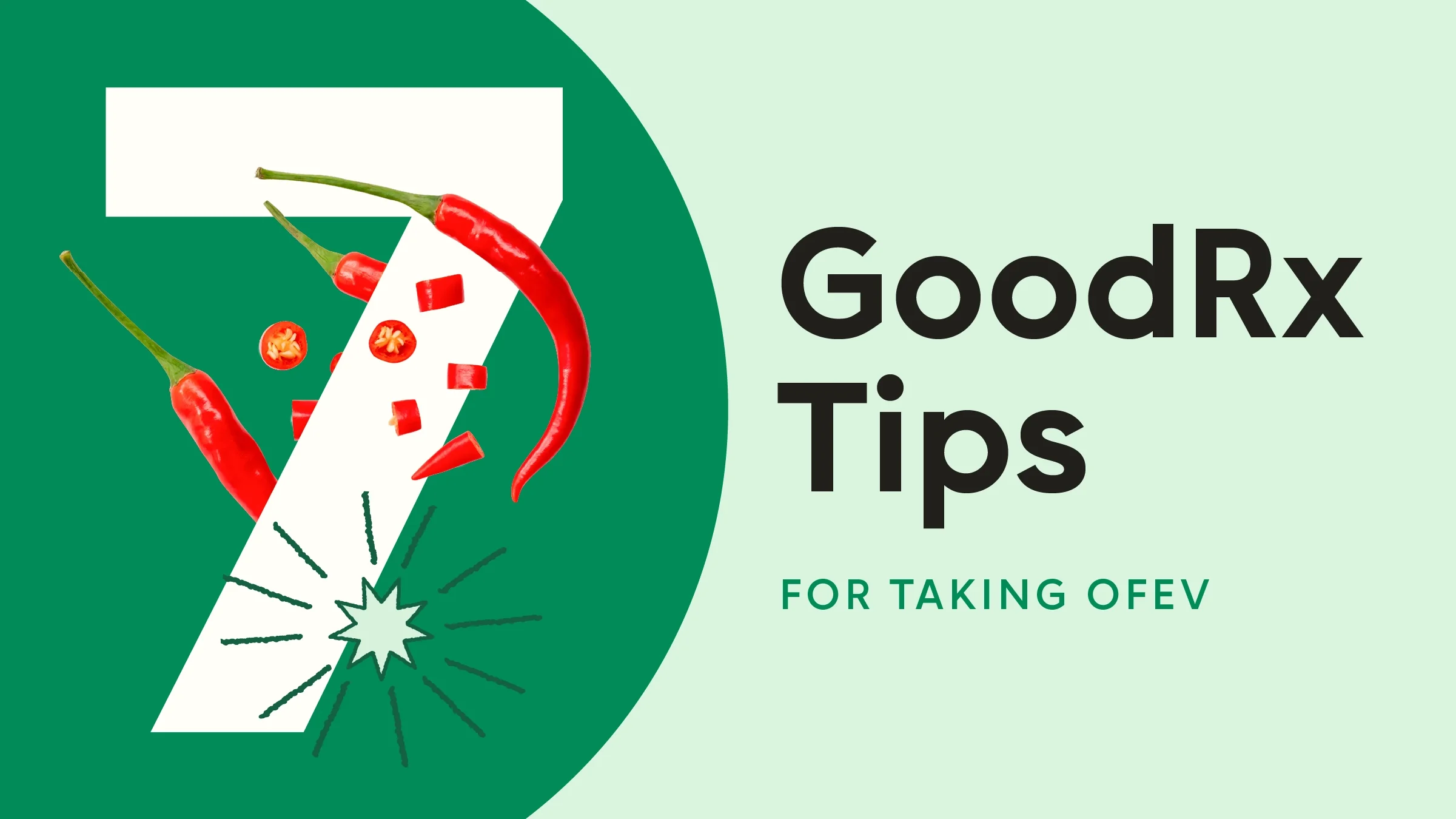Key takeaways:
Ofev (nintedanib) is a prescription medication used to manage different forms of interstitial lung disease. This condition causes the lungs to become stiff, leading to coughing and difficulty breathing.
Taking Ofev with food can help reduce side effects such as diarrhea, nausea, and stomach pain. Try to limit spicy foods, high-fiber foods, and alcoholic beverages. Doing so helps prevent worsening gut symptoms.
Ofev takes time to start working, usually around 6 to 12 weeks. Sticking with your treatment plan and following your healthcare professional’s advice are the keys to a successful treatment.
Save on related medications
Ofev (nintedanib) is an FDA-approved prescription medication that treats interstitial lung disease (ILD). This includes idiopathic pulmonary fibrosis (IPF), progressive fibrosing interstitial lung diseases (PF-ILD), and systemic sclerosis-associated interstitial lung disease (SSc-ILD).
Ofev is a tyrosine kinase inhibitor. It blocks tyrosine kinase proteins from causing stiffness in the lungs.
Ofev helps slow down lung scarring over time. But it can cause side effects, too, especially stomach upset and other gut-related issues. Certain foods can worsen or trigger these symptoms. Knowing how to take Ofev and plan your diet can help you make the most of the medication’s benefits and keep side effects to a minimum.
Here, we’ll share seven pharmacist-backed tips to keep in mind while taking Ofev.
1. Foods to avoid while taking Ofev
Certain foods can worsen Ofev’s side effects. Although you should take Ofev with food, choosing the right foods is important to help manage or prevent side effects.
Common examples of foods and drinks to avoid to reduce side effects include:
Spicy or acidic foods
Fried or greasy foods
High-fiber foods, such as beans, lentils, and whole grains
Fatty dairy products, such as whole milk, whipped cream, and ice cream
Fatty meats
Alcohol
2. How to manage common Ofev side effects
Diarrhea, nausea, and vomiting are the most common Ofev side effects. These effects should get better over time as your body gets used to the medication.
In the meantime, here are some tips to manage them:
Drink plenty of water to prevent dehydration, especially if you have persistent diarrhea.
If you’re feeling nauseous, try sticking to foods that are gentle on the stomach. Your prescriber may recommend that you follow the “BRAT diet,” which includes starchy, bland foods such as bananas, rice, applesauce, and toast.
Ask a pharmacist about trying an over-the-counter (OTC) antidiarrheal.
If your side effects are hard to manage, talk to a healthcare professional about your symptoms. Keeping track of when your symptoms happen can help you and your healthcare team uncover patterns and find ways to manage them better.
3. Ofev doesn’t start working right away
Ofev works to slow down lung function decline over time. It doesn’t kick in right away.
Ofev typically takes about 6 to 12 weeks to start working. In clinical studies, people with ILD showed improvements in lung function after taking Ofev for at least 6 weeks, as measured by forced vital capacity (FVC). FVC is the amount of air you can forcibly exhale from your lungs after taking the deepest breath possible.
Want to boost your lung capacity? Try these breathing exercises to help strengthen your respiratory muscles and improve your lung function.
Medications that affect your breathing: Discover which common drugs may lead to shortness of breath or low oxygen levels.
Curious about living with pulmonary fibrosis? Learn about its stages and effects on life expectancy.
These effects seem to persist, too. Longer-term studies found that Ofev significantly reduced the risk of sudden IPF worsening over about 1 year compared to placebo.
4. Ofev may improve life expectancy
Ofev may help people with pulmonary fibrosis live longer. That’s because pulmonary fibrosis gradually worsens over time.
A 2023 study found that people taking Ofev for IPF had a 55% lower risk of death over 2 years compared to those who didn’t receive an antifibrotic treatment. An antifibrotic is a type of medication that helps slow down the formation of scar tissue.
What’s more, a review of six clinical studies found that people with IPF who took Ofev lived about 11 years on average. This is compared to nearly 4 years among those who took a placebo. Starting Ofev early and consistently taking it may have helped protect their lungs and manage pulmonary fibrosis over the long term.
5. If you smoke, Ofev will be less effective
Smoking can make lung disease worse. It can also reduce how well Ofev works.
When you smoke, your body absorbs less of the medication. This can make Ofev less effective for treating ILD. For the best results, it’s strongly recommended to quit smoking before starting Ofev and to avoid smoking while taking it. You should also avoid secondhand smoke, if possible.
6. Ofev is risky during pregnancy
Ofev can cause harm to an unborn baby. So it’s not recommended during pregnancy.
If you’re able to become pregnant, you should take a pregnancy test before starting Ofev. Your prescriber will likely recommend that you use an effective birth control method while taking Ofev. You should continue using it for at least 3 months after stopping Ofev, too.
7. Other tips for maximizing success with Ofev
To help Ofev work as well as possible,consider these tips:
Keep your Ofev capsules in the container they came in and out of the reach of children. Also, store them at room temperature and away from too much heat and moisture.
Swallow Ofev capsules whole. Don’t open or crush them — take them as they are.
Let your healthcare professional know if you have any liver or heart problems, a history of blood clots or bleeding issues, or if you've had recent stomach surgery. And if you’re breastfeeding or planning to breastfeed, make sure to mention that, too.
Tell your healthcare team about all the medications and supplements you're taking. This helps them make sure nothing will interfere with your treatment.
If you notice anything unusual, like yellowing of your skin or eyes, dark urine, stomach pain, or any unusual bleeding or bruising, let your healthcare professional know right away. And tell them if you start feeling extra tired or losing your appetite. It’s always best to check in with your prescriber if something doesn’t feel quite right.
Frequently asked questions
It’s recommended to avoid fatty dairy products (e.g., whole milk, whipped cream, ice cream) while taking Ofev. They may worsen upset stomach symptoms. Nonfatty dairy products, such as skim milk and/or milk alternatives, are likely a better choice.
Try to avoid alcoholic beverages while you’re taking Ofev. Alcohol can increase your risk of liver problems and may worsen the risk of side effects from Ofev.
Ofev is taken as long-term, maintenance treatment. There’s no set time limit for using it. Studies show that many people can safely take Ofev for years. Your healthcare professional should monitor your progress through regular checkups and lung tests.
If you forget to take a dose of Ofev, take your next dose the following day as usual with food. Do not take an extra dose to make up for a missed dose. To stay on track, consider setting reminders or using a medication reminder app.
It’s recommended to avoid fatty dairy products (e.g., whole milk, whipped cream, ice cream) while taking Ofev. They may worsen upset stomach symptoms. Nonfatty dairy products, such as skim milk and/or milk alternatives, are likely a better choice.
Try to avoid alcoholic beverages while you’re taking Ofev. Alcohol can increase your risk of liver problems and may worsen the risk of side effects from Ofev.
Ofev is taken as long-term, maintenance treatment. There’s no set time limit for using it. Studies show that many people can safely take Ofev for years. Your healthcare professional should monitor your progress through regular checkups and lung tests.
If you forget to take a dose of Ofev, take your next dose the following day as usual with food. Do not take an extra dose to make up for a missed dose. To stay on track, consider setting reminders or using a medication reminder app.
The bottom line
Ofev (nintedanib) is a prescription medication that treats different forms of interstitial lung disease (ILD). While Ofev can be helpful, it may also cause side effects, such as diarrhea, nausea, and stomach pain. Foods to avoid while taking Ofev include spicy and fried foods, fatty dairy products, and alcoholic beverages. This can help limit these side effects. Avoid smoking, too. It can make Ofev less effective.
Ask your prescriber and pharmacist about other ways to maximize your Ofev prescription.

Why trust our experts?



References
Boehringer Ingelheim Pharmaceuticals. (2024). Ofev- nintedanib capsule [package insert].
David, S., et al. (2023). Vital capacity. StatPearls.
Fala, L., et al. (2014). Ofev (nintedanib): First tyrosine kinase inhibitor approved for the treatment of patients with idiopathic pulmonary fibrosis. American Health & Drug Benefits.
Gole, S., et al. (2024). Nintedanib. StatPearls.
Lancaster, L., et al. (2019). Safety and survival data in patients with idiopathic pulmonary fibrosis treated with nintedanib: Pooled data from six clinical trials. BMJ Open Respiratory Research.
Maher, T. M., et al. (2019). Antifibrotic therapy for idiopathic pulmonary fibrosis: Time to treat. Respiratory Research.
Makino, S. (2021). Progressive fibrosing interstitial lung diseases: A new concept and indication of nintedanib. Modern Rheumatology.
Perelas, M., et al. (2020). Systemic sclerosis-associated interstitial lung disease. The Lancet Respiratory Medicine.
Richeldi, L., et al. (2014). Efficacy and safety of nintedanib in idiopathic pulmonary fibrosis. The New England Journal of Medicine.
Štefániková, M., et al. (2023). The effect of nintedanib on lung functions and survival in idiopathic pulmonary fibrosis: Real-life analysis of the Czech EMPIRE registry. BMC Pulmonary Medicine.



